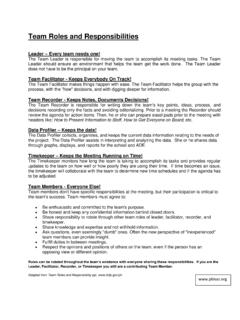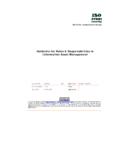Transcription of Qualifications, Roles and Responsibilities of the ...
1 Excerpt taken from Implementation Manual for USAID PAT project, developed by The IRIS Center, Implementation team should include the following members: Project Manager: oversees planning and implementation of the field survey. Field Supervisors: coordinate daily activities of interviewers and performsquality control in the field. Interviewers: thoroughly learn survey questions and interview techniques tominimize bias, and conduct interviews in a confident and relaxed manner. Sampling and Survey Tracking Coordinator: creates and maintains trackingsystem for survey implementation; ensures sampling plan is maintained. Data Processing Coordinator: identifies and trains data processors and maintainsquality control in data processing Data Processors: enter and clean data collected in the survey, and possibly helpwith generation of client lists for sampling and data , Roles and Responsibilities of the Implementation TeamSkilled personnel who are well trained and motivated can strongly influence the success of yourfield operation.
2 The implementation team for the Poverty Assessment Tool should include anoverall project manager, two field supervisors, 5-8 interviewers, a tracking coordinator, a dataprocessing coordinator, and two data entry personnel. Depending on the skills and available timeof the project manager, an additional member of the research team can be helpful for overseeingthe time and resources used in each step of the process. It also might be appropriate for an MISmanager to oversee the data taken from Implementation Manual for USAID PAT project, developed by The IRIS Center, ManagerA project manager will take overall responsibility for planning and implementing the fieldsurvey. The manager will oversee and participate in the training of staff, supervise the translationof the survey, and verify that the sampling is being done correctly and that only sampled clientsare being interviewed. He or she will monitor progress towards completing the survey and willdo spot checks to verify that interviewers are following the questionnaires consistently duringinterviews and filling in the forms correctly and completely, and that the supervisors are carryingout their quality control function.
3 The manager will monitor the team s progress in staying onschedule and within budget as the field work progresses. Ideally, the manager will have previousassessment or monitoring and evaluation experience, as well as an excellent track record forsuccessfully managing resources and personnel. The project manager should complete thefollowing tasks:TasksDuring Planning/Training- Hire/assign team members- Plan, implement, oversee training with field supervisor- Develop implementation plan (schedule, logistics, etc.)- Qualitative review of training materials, sample, questionnaire, and internal control system- Questionnaire translation and editingDuring Interviewing- Communicate with field supervisor on a regular basis- Inquire on a regular basis about results vs. targetsDuring Data Processing- Inquire about data entry issues and results vs. targets- Conduct spot checksThroughout:- Budget- Communications with Help Desk, as needed- Submit deliverables- Ability to troubleshoot and devise back-up plans if necessaryRequired Qualifications/Competencies- Project management experience- Staff management experience- Monitoring & evaluation experience- Budget management experience- Good communications skills- team spirit/motivates staff- Capable of delegating Responsibilities - Ability to translate final objective to field staff- Knowledge of local contextExcerpt taken from Implementation Manual for USAID PAT project, developed by The IRIS Center, Good report writerExcerpt taken from Implementation Manual for USAID PAT project, developed by The IRIS Center, SupervisorsIt is recommended that two field supervisors manage between three and four interviewers , only one field supervisor may be used if the travel logistics permit the use of oneinterview team for the field work.
4 They should help with the interviewer training and translationof the survey. Field supervisors are responsible for coordinating the daily activities of theinterviewers, including arranging movement to and from interviews and transport from onesurvey site to the next. Supervisors also take responsibility for strict quality control, includingensuring that the questionnaires are filled out correctly and completely and that the informationcontained in them is accurate before leaving each survey area. Field supervisors check the workof each interviewer on a daily basis to minimize the number of errors and missing also conduct occasional random spot checks to verify the accuracy of data bypartially repeating a household interview without the interviewer being supervisors report regularly to the manager on progress, costs incurred, and anyirregularities in the field. Supervisors should have prior experience in conducting quantitativesurveys, have strong leadership skills, excellent attention to details and time management, and beassertive in supervising interviewers to ensure that high-quality data is Planning/Training- Help with translation of survey- Plan fieldwork logistics (transport, schedules, distribution of interviewers)- Help with interviewer trainingDuring Interviewing- Coordinate daily activities of the interviewers- Quality control (questionnaires filled correctly, completely, random spot checks)- Check/observation of interview process- Report to project manager (progress and irregularities)During Data Processing- Solve questions (data processors)Required Qualifications/Competencies- Prior experience in conducting quantitative surveys (including as an interviewer)- Strong leadership skills (assertive in supervising interviewers.)
5 Listening skills)- Attention to detail- Time management- Ability to receive criticism/to provide constructive criticism- Initiative to take decisions and solve problems on the spotExcerpt taken from Implementation Manual for USAID PAT project, developed by The IRIS Center, with prior field and survey experience are desirable, but just as important areindividuals with strong communication skills who can carry out interviews in a confident andrelaxed manner while maintaining their train of thought. All interviewers require thoroughtraining that includes in-depth review of the questionnaire to understand its intent and repeatedpractice in posing the questions in the local not send field staff to interview clients with whom they have had previous business orpersonal relations. Institutions have the option to use administrative staff or to use field stafffrom other regions so that they do not interview anyone they Planning/Training- Participate in training- Understand the aim of the survey- Review the questionnaire- Repeat practice in interviewing.
6 Using the questionnaire- Role play- Be available throughout the training processDuring Interviewing- Respect the schedule and planning process- Respect clients and adapt questionnaire to their level of education and ability to understand- Follow instructions- Ask questions with precision- Record information accurately- Use probing questions when necessary- Keep the same quality of work throughout the process- Resolve any logistic or other problems or report to the field supervisor as necessary- Take an active part in the de-briefing process- Be aware of process issuesQualifications/Competencies- Knowledge of local language- Previous field experience- Observation skills- Recording skills- Problem-solving skills- Willingness to follow instructions and accept supervision- Precision in asking and recording information- Good disposition and ability to put the interviewee at ease- Efficiency in getting the interviewer done while meeting all the cultural norms forpoliteness, thus leaving a good (or at least neutral) impression about the MEP in the mind ofthe intervieweeExcerpt taken from Implementation Manual for USAID PAT project, developed by The IRIS Center, Curiosity about the research topic that will lead to better probing, insuring that they arerecording what the interviewee said and not what they preconceived about what the person should say - Culturally acceptable appearance- Willingness to work long hours while maintaining the same quality in the last interview as inthe first interview- Ability to observe body language, the quality of house construction, the setting in the house,the tools and stock in the business, etc.
7 That can lead to probing questions when the answersseem to contradict what is being taken from Implementation Manual for USAID PAT project, developed by The IRIS Center, and Survey Tracking CoordinatorThe Tracking Coordinator plays a key role in tracking the progress of survey implementation andmaintaining the sampling Planning/Training- Work with Project Manager and Field Supervisor to set up numbering system for allsurveys: quantitative and test surveys, including replacement selections for each Participate in sampling selection and oversee the assignment of survey Set up a system to monitor location and status of each survey, including the assignment ofsurveys from the replacement Assist with training, as Interviewing- Monitor distribution and collection of surveys from each sampling group, including constantcommunication with all team Leaders and Project Manager (or Coordinator) to ensure thatall production goals are being Assist with quality control of surveys and returning of surveys to the field, if Make daily contributions to newsletter, if sending one out to the interview Assist with supervision of data processing and other duties, as Data Processing- Confirm that all surveys have been handed in and are completely filled Compile statistics totaling number of surveys completed for each sampling group andsupervise a physical counting of documents to confirm the Assist with data cleaning and analysis, and with all tasks involved in generating statistics,graphs and tables for the final Assist in final organization of computer files and filled in Qualifications/competenciesEducation- Degree in social sciences or equivalentExperience- Research experience- team management- Work experience in MFI/development institution (2 years or more)
8 - Can make quick decisionsExcerpt taken from Implementation Manual for USAID PAT project, developed by The IRIS Center, Processing CoordinatorThis coordinator oversees the data processing system. S/he trains the data processors andperforms spot checks to ensure data is accurately entered into the system. Specific tasks include:TasksDuring Planning/Training- Lead training on EPI Info (see Chapter 7), survey coding and data entry Participate in survey design and how that affects the data input and Install EPI Info software and copy all pertinent files containing forms and procedures to harddrive of all applicable After supervising coding of alpha answers from surveys and the creation of controls for dataentry, personally test data After any changes are made to survey questions and layout, ensure that changes are reflectedin files on EPI Directly oversee data entry of first few surveys to ensure everything is being done Interviewing and Data Processing- Participate in and oversee quality control of survey forms, and make sure that incompleteforms are returned to appropriate supervisors for Continue to monitor coding of alpha answers to ensure consistency and Solve EPI problems that come up each Supervise data input and With other team leaders.
9 Set up a standard format for distributing updates and corrections toall members of evaluation process (bulletin/newsletter) and contribute information daily tothis Data Processing and Analysis- Make sure that all surveys have been entered and Data cleaning to ensure all records are complete and properly Meet with Project Manager (or Coordinator), team leaders, program executive management,and in-country consultant to discuss specific goals for data analysis (if further analysis iscarried out).- Begin analysis of data, including demographical information for Assist all personnel working on final report in the retrieval of data, analysis, and creation oftables and graphs for presentation of After data analysis is completed, assist Project Manager (or Coordinator) in organization andcopying of all files onto disks or laptops, and also onto various locations of programcomputers, as Ensure survey forms are filed and kept in a safe and accessible Qualifications/Competencies- Professional degree in data processing - Teamwork- Experience in data analysis- Good communication- Ability to ensure confidentiality- Decision-making initiative- Leadership capabilitiesExcerpt taken from Implementation Manual for USAID PAT project, developed by The IRIS Center, ProcessorsThose entering the survey data into the computer should have experience in both data entry andrelated quality control procedures.
10 It would be preferable for them to have experience in the cleaning of statistical data, the ability to sort and extract client lists from the MIS to be usedfor sampling, as well as some basic knowledge of statistical analysis. The ability to create graphsin Excel and also use PowerPoint would help in the preparation of any presentations to be givento the management, Board and many cases, personnel involved in field operations may be the same as those who laterparticipate in the data analysis. Even those with no statistical training can help those who dohave it in interpreting what the results mean for your particular Planning/Training:- Receiving specialized training- Make/Discuss a plan of needs during the project (logistics, etc.)- Prepare equipment and test systems- Learn to use EPI InfoDuring Interviewing:- Finalize all equipment and systems (1st day)- Begin data entry daily- Report problems/obstacles to Data Processing CoordinatorDuring Data Processing:- Continue data entry- Quality control of your own work- Report problems to Data Processing Coordinator- Provide Data Processing Coordinator with requested informationRequired Qualifications/Competencies- Two-three years experience in data entry (statistics a plus)- Knowledge/experience with MS Word, Excel, PowerPoint- Detail oriented- Availability throughout project period- Can keep data confidentialTIP: If an MEP does




